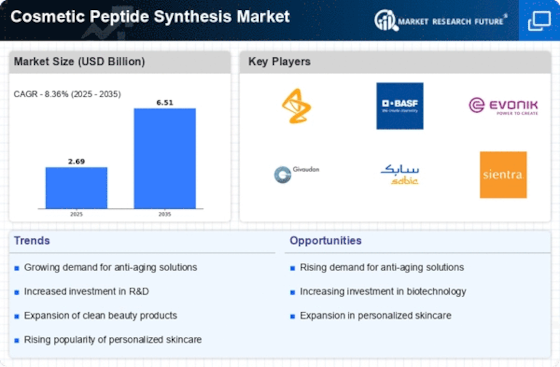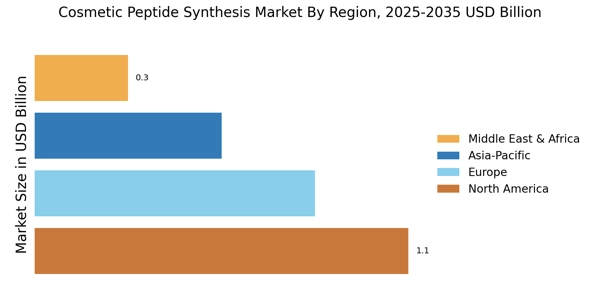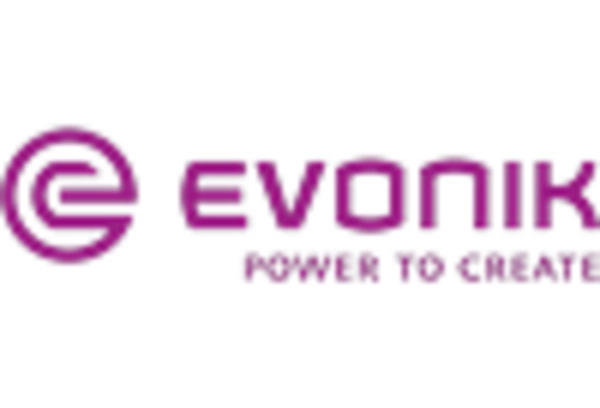Expansion of E-commerce Platforms
The Cosmetic Peptide Synthesis Market is experiencing a transformation due to the rapid expansion of e-commerce platforms. As consumers increasingly turn to online shopping for their beauty needs, brands are leveraging digital channels to reach a broader audience. This shift is particularly beneficial for niche products, including those based on peptide technology, which may not be widely available in traditional retail settings. Data suggests that e-commerce sales in the beauty sector are expected to grow by over 20% in the coming years. This trend not only enhances accessibility for consumers but also allows brands to engage directly with their customers, thereby driving growth in the Cosmetic Peptide Synthesis Market.
Rising Popularity of Clean Beauty
The Cosmetic Peptide Synthesis Market is witnessing a significant shift towards clean beauty products, which prioritize safety and sustainability. Consumers are increasingly seeking formulations that are free from harmful chemicals and synthetic additives. This trend is reflected in the growing preference for peptides derived from natural sources, which are perceived as safer and more effective. Market data suggests that the clean beauty segment is expected to grow by over 10% annually, as brands adapt their offerings to align with consumer values. This shift not only influences product development but also encourages transparency in ingredient sourcing, thereby fostering trust within the Cosmetic Peptide Synthesis Market.
Growing Demand for Anti-Aging Products
The Cosmetic Peptide Synthesis Market is experiencing a notable surge in demand for anti-aging products. As consumers become increasingly aware of the effects of aging on skin, the market for peptides that promote skin elasticity and reduce wrinkles is expanding. Research indicates that the anti-aging segment is projected to grow at a compound annual growth rate of approximately 8% over the next five years. This growth is driven by a demographic shift towards an aging population that seeks effective solutions for skin rejuvenation. Consequently, manufacturers are investing in the development of innovative peptide formulations that cater to this demand, thereby enhancing their market presence in the Cosmetic Peptide Synthesis Market.
Technological Innovations in Peptide Synthesis
Technological advancements in peptide synthesis are playing a crucial role in shaping the Cosmetic Peptide Synthesis Market. Innovations such as solid-phase peptide synthesis and automated synthesis techniques are enhancing the efficiency and scalability of peptide production. These advancements allow for the creation of more complex and diverse peptide structures, which can lead to improved efficacy in cosmetic applications. As a result, the market is likely to see an influx of novel peptide-based products that cater to specific skin concerns. The integration of technology in peptide synthesis not only streamlines production processes but also reduces costs, making it a pivotal driver in the Cosmetic Peptide Synthesis Market.
Increased Investment in Research and Development
The Cosmetic Peptide Synthesis Market is benefiting from heightened investment in research and development activities. Companies are allocating substantial resources to explore the potential of peptides in various cosmetic applications, including skin repair, hydration, and anti-inflammatory effects. This focus on R&D is expected to yield innovative products that meet evolving consumer demands. Market analysis indicates that R&D spending in the cosmetic sector is projected to increase by approximately 15% over the next few years. This investment not only fosters innovation but also enhances competitive advantage, positioning companies favorably within the Cosmetic Peptide Synthesis Market.

















